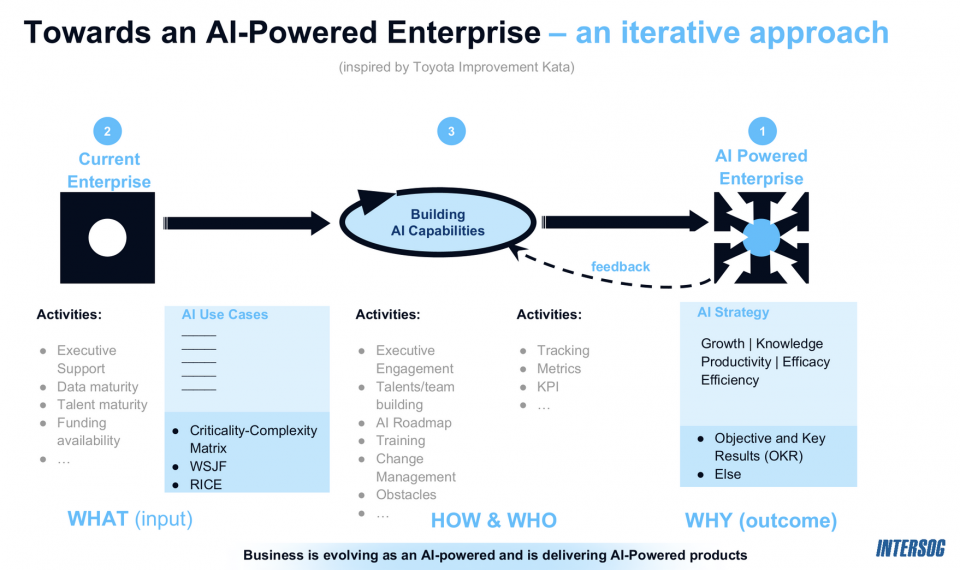As businesses look for ways to stay ahead of the competition, AI implementation plays a big role in driving growth and innovation. In our recent webinar, Dr. Joseph Barjis, PhD, VP of AI and Agility, shared some practical tips on how companies can systematically implement AI across their organization to make a real impact. With over 20 years of experience working with major brands, Dr. Barjis developed a simple framework to help businesses tackle the challenges of AI product management.
Becoming an AI-Powered Company
AI transformation begins with a clear, goal-oriented strategy. One of the key points discussed during the webinar was the importance of aligning AI initiatives with measurable business outcomes such as operational efficiency and long-term growth.
Conducting a gap analysis is also essential before starting your AI journey. This means looking at where your company stands when it comes to data maturity, talent, and available funding. Securing funding for at least three years is critical to prevent projects from being halted due to budget cuts. In fact, 75% of businesses cite budget constraints as a key factor in delaying or stopping AI projects.
AI Product Management in Action: Real Applications
During the webinar, Dr. Joseph Barjis shared real-world examples of how companies tackle AI product management challenges. From long-term investments to innovation labs and AI-driven solutions, these examples show how businesses are successfully navigating the AI landscape:
- Accenture’s Long-term AI Strategy: Accenture’s $3 billion investment in AI over several years underscores the importance of long-term planning. By securing funding over several years, the company ensures that AI models are refined, data is collected, and iterations are made - leading to more advanced AI applications.
- AI Innovation Labs: Many companies are setting up AI innovation labs to foster experimentation and develop proof-of-concept (PoC) projects. For example, tech giants like Google and OpenAI are using innovation labs to test AI-driven projects in low-risk environments. These labs help identify which solutions are scalable and ready for full deployment. Only about 25% of AI projects successfully make it past the PoC phase, highlighting the need for structured frameworks to manage the scaling process.
- AI-driven Chatbots: Initially deployed for basic customer service inquiries, chatbots become more effective and sophisticated over time as they collect data, allowing businesses to streamline customer service operations. Studies show that implementing AI chatbots can lead to a 30% increase in operational efficiency when deployed effectively.
Scaling AI Solutions Through Iteration
Scaling AI solutions can be one of the most challenging aspects of AI product management. The success of scaling often lies in an iterative process - deploying AI models, collecting data, refining them based on feedback, and repeating the cycle. Each iteration leads to improved models and better outcomes.
AI-powered chatbots, for instance, start by handling basic inquiries but improve with each iteration as they gather more data. This process enables businesses to enhance customer interactions and optimize internal processes over time.

Addressing Common Challenges in AI Product Management
Despite its potential, AI implementation comes with several challenges. Some of the most common hurdles businesses face when managing AI projects include:
- Technology limitations: Many organizations rely on legacy systems that are not built to support AI technologies, requiring significant infrastructure upgrades.
- Skill shortages: A major barrier is the scarcity of AI talent, particularly in machine learning and data science. It’s estimated that 60% of organizations report a lack of AI talent as a major obstacle to implementation.
- Data quality: AI models are only as effective as the data they are built on. Poor-quality data can lead to flawed models and ineffective automation processes.
- Governance risks: Establishing governance frameworks ensures that AI outputs are accurate and free from bias. Continuous monitoring of AI systems helps mitigate potential risks.
AI product management is an ongoing journey that requires a well-structured strategy, sustained investment, and iterative development. The insights and examples shared in the webinar provide a clear path for businesses looking to leverage AI to improve operations and drive growth.
Ready to learn more about AI product management and how to transform your business with AI? Watch our webinar on-demand and explore strategies and examples for successfully integrating AI into your business.
